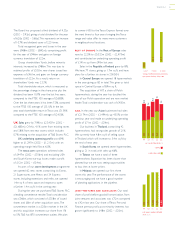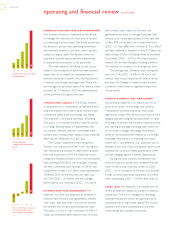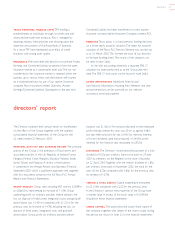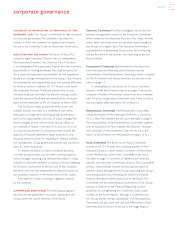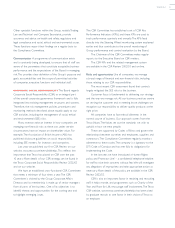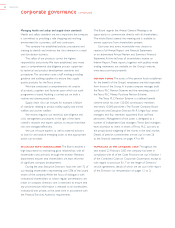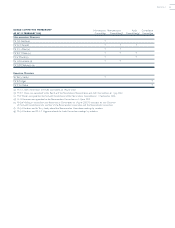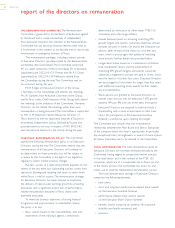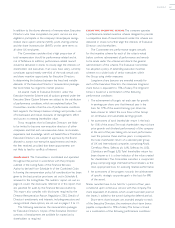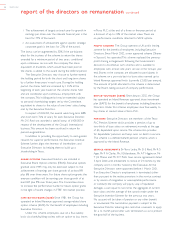Tesco 2003 Annual Report Download - page 15
Download and view the complete annual report
Please find page 15 of the 2003 Tesco annual report below. You can navigate through the pages in the report by either clicking on the pages listed below, or by using the keyword search tool below to find specific information within the annual report.
TESCO PLC 13
In addition to the above elements of remuneration, Executive
Directors who have completed one year’s service are also
eligible to participate in the company’s all-employee savings-
related share option scheme (SAYE), profit sharing scheme
and the share incentive plan (BAYE) on the same terms as
all other UK employees.
The Committee considers that a high proportion of
total remuneration should be performance-related and at
risk of forfeiture. In addition, performance-related reward
should be delivered in shares to closely align the interests of
shareholders and executives. In all cases, base salary currently
constitutes approximately one-third of the total annual cash
and share incentive opportunity for Executive Directors.
In determining the balance between the fixed and variable
elements of the Executive Directors’ remuneration packages,
the Committee has regard to market practice.
All awards made to Executive Directors under the
Executive Incentive Scheme and all options granted under the
Executive Share Option Scheme are subject to the satisfaction
of performance conditions, which are explained below.The
Committee considers that the mix of performance conditions
best supports the Group’s business strategy and provides a set
of broad-based and robust measures of management’s effort
and success in creating shareholder value.
Tesco recognises that its Executive Directors are likely
to be invited to become non-executive directors of other
companies and that such non-executive duties can broaden
experience and knowledge, which will benefit Tesco.Therefore,
Executive Directors are, subject to approval by the Board,
allowed to accept non-executive appointments and retain
the fees received, provided that these appointments are
not likely to lead to conflicts of interest.
COMPLIANCE The Committee is constituted and operated
throughout the period in accordance with the principles
outlined in the Listing Rules of the Financial Services
Authority derived from Schedule A of the Combined Code.
In framing the remuneration policy, full consideration has been
given to the best practice provisions set out in Schedule B,
annexed to the Listing Rules.The auditors’ report set out on
page 23, covers the disclosures referred to in this report that
are specified for audit by the Financial Services Authority.
This report also complies with disclosures required by the
Director Remuneration Report Regulations 2002. Details of
Directors’ emoluments and interests, including executive and
savings-related share options, are set out on pages 15 to 21.
The following summarises the remuneration packages
for Executive Directors. Copies of the Executive Directors’
contracts of employment are available for inspection by
shareholders as required.
EXECUTIVE INCENTIVE SCHEME The company operates
a performance-related incentive scheme designed to provide
a competitive level of reward. Awards under the scheme are
delivered in shares to further align the interests of Executive
Directors and shareholders.
The Committee sets performance targets annually
for the incentive scheme for each of the criteria noted
below, confirms achievement of performance and awards
to be made under the scheme and directs the general
administration of the scheme.The Executive Committee
has adopted a policy of extending executive incentive
schemes to a wider body of senior executives within
the Group using similar measures.
Long-term share bonuses are awarded annually for
each of the Executive Directors, the maximum long-term
share bonus is equivalent to 75% of salary. The long-term
bonus is based on a combination of the following
performance conditions:
1The achievement of targets set each year for growth
in earnings per share over that financial year is the
basis for 77% of the award. Earnings per share has
been chosen to reflect the core focus of the Group
on continuous and sustainable earnings growth.
2An assessment of total shareholder return is the basis
for 15% of the award.The total shareholder return (share
price growth and dividend performance) of the company
at the end of the year, taking into account performance
over the previous three and five years, is compared to
the total shareholder return of a selected peer group
of UK and International companies, comprising Ahold,
Carrefour, Metro, Safeway plc (UK), Safeway Inc. (US),
J Sainsbury and Target (US).Total shareholder return has
been chosen as it is a clear indicator of the value created
for shareholders. The Committee considers a comparator
group comprising large international food retailers as the
most appropriate basis for assessing relative performance.
3An assessment of the progress towards the achievement
of specific strategic corporate goals is the basis for 8%
of the award.
Shares awarded have to be held for a period of four years,
conditional upon continuous service with the company.The
share equivalent of dividends, which would have been paid on
the shares, is added to the award during the deferral period.
Short-term share bonuses are awarded annually to each
of the Executive Directors, the maximum short-term bonus
payable is equivalent to 75% of salary. The bonus is based
on a combination of the following performance conditions:


